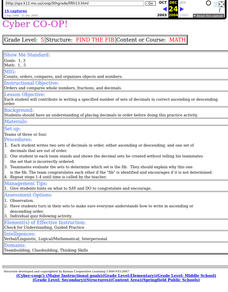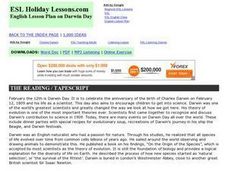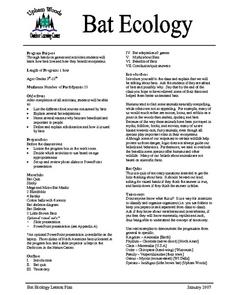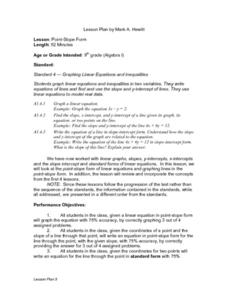Curated OER
Thinking About Hate
This lesson starts out with a guided discussion about the statement "Birds fly in the sky; airplanes fly in the sky; therefore, airplanes are birds" and goes on to cover logical fallacies and reliable sources, relating these to the topic...
Curated OER
The Human Impact on the Environment
Despite the typos and formatting issues, the Word document found here has some great potential. There are two questions that ask learners to put several events in a logical order; these could easily be made into a card sort activity....
Curated OER
What's the Correct Order? (On-line Interactive)
For this word order worksheet, students read the eight words in a list and put them together in order to make a logical sentence. This is an on-line interactive quiz with 10 questions.
Curated OER
The Answer Is- What Is the Question
Learners review subject matter using a game format. In this quiz game instructional activity, students work in small groups or teams to state the question that matches the answer given by the teacher. (This is similar to the game of...
Shmoop
ELA.CCSS.ELA-Literacy.RI.11-12.3
Make analyzing the sequence of events in an informational text easy. Ask readers to craft a one-sentence summary of each paragraph in a document and create a text map. To demonstrate their understanding of the process, participants read...
Curated OER
The Economic Way of Thinking - About Everything
Students write their definitions of economics on index cards and revise them as the lesson plan continues. They discuss the principles of economic reasoning and after completing a quiz, use economic reasoning to solve "real life" mysteries.
Alabama Learning Exchange
Presenting the Water Cycle
Third graders complete a unit of study about the water cycle using both print and Internet based resources. They examine fresh and salt water and complete an online quiz before developing a multimedia presentation highlighting the phases...
Curated OER
Much Ado About Nothing
Students read and analyze the works of Shakespeare. In this "Much Ado About Nothing" instructional activity, students deicper the play and research Shakespeare's works. Students create a quiz based on his life and re-enact a scene from...
Curated OER
Find The Fib - Decimals
Fifth graders count, order, compares, and organize objects and numbers. Each student will contribute in writing a specified number of sets of decimals in correct ascending or descending order.
Curated OER
Line Ups
Fifth graders describe the lunar cycle. develop an understanding of the order and phases of the moon. Each student in a team contributes orally in order to make a line up of the moon phases in order.
Curated OER
Reading the Movies: Another Approach To Teaching Critical Thinking Skills And Writing
Students explore the elements of film to analyze character, action, and the themes in the movie, "Quiz Show." The lesson encourages students to make personal connections and real life applications as they view the movie, critically.
Curated OER
Darwin Day
For this Darwin Day worksheet, students read or listen to a tape passage about Charles Darwin, then match phrases, fill in the blanks, choose words, unscramble words and sentences, put sentences in order, write discussion questions and...
Curated OER
Bat Ecology
Young scholars, through hands on games and activities, discover how bats live and how bats benefit ecosystems. They play a game designed to show them how echolocation works and another to show how mother bats locate their young through...
Curated OER
Point-Slope Form
Ninth graders explore the point-slope form of linear equations and graph lines in the point-slope form. After completing the point-slope equation, they identify the slope of a line through a particular point. Students explain the...
Curated OER
Standard Linear Form
Ninth graders identify and describe the x-intercept as the place where the line crosses the x-axis as it applies to football. They create their own differentiations to reinforce the distinction between the x-intercept and the...
Curated OER
Cause and Effect
Students identify cause and effect relationships in a short story. After reading a short story, they participate in a discussion of how one event in a story can lead to several others. Students are then paired for a matching task that...

















